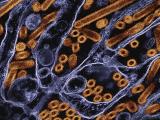May 19, 2006 (CIDRAP news) – The World Health Organization (WHO) today confirmed that a 12-year-old Indonesian boy from East Jakarta died of avian influenza.
The boy was not part of the extended family case cluster in northern Sumatra that involved at least six people, five of whom died. Officials are still investigating the source of that outbreak and whether it involved human-to-human transmission.
The 12-year-old was hospitalized May 7 and died May 13. An investigation is underway to determine the source of his infection, according to today's WHO report. However, Nyoman Kandun, director-general of disease control for Indonesia's Ministry of Health, told Agence France-Presse (AFP) today, "We suspect it was from backyard chickens."
The boy's death, which the news media first reported May 17, brings the H5N1 death toll in Indonesia to 32 and the case total to 41. The WHO's global count has reached 217 cases with 123 deaths.
Health officials have said the family cluster in Sumatra does not to be associated with any other cases beyond the family, but they have not ruled out person-to-person spread.
In their continuing search for the source of the outbreak, officials have found no evidence of current H5N1 infection in pigs from the family's village.
As reported yesterday, initial tests had shown antibodies in 10 of 11 pigs tested. But subsequent nasal swabs revealed no H5N1 virus, said Syamsul Bahri, animal health director for the Indonesian agriculture ministry, as quoted in a Reuters report today.
Bahri said swab tests on poultry from the same village also were negative, but more tests would be run to confirm the findings, according to the story.
In another Reuters report today, Leo Poon, a University of Hong Kong microbiologist, said the discovery of antibodies in the pigs could mean that the pigs were previously infected with H5N1, but the infection did not persist.
See also:
May 19 WHO statement on Indonesian case
http://www.who.int/csr/don/2006_05_19/en/index.html


















